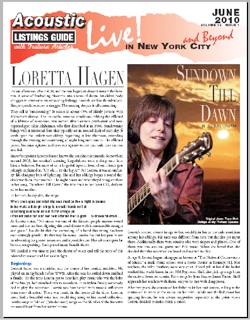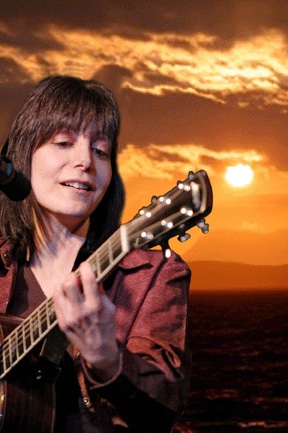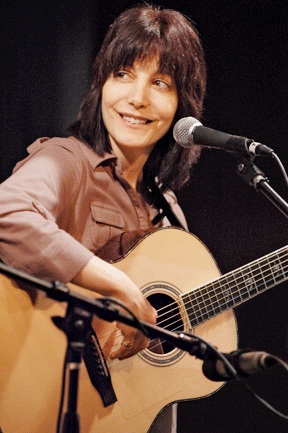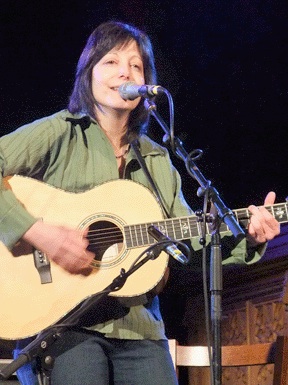Loretta Hagen
Sundown Till Dawn
by Richard Cuccaro
Original photo: Tracy Stoft
Collage w/ sky: Richard Cuccaro
It’s late afternoon, about 4:30, and the sun begins its descent toward the horizon. A sense of foreboding blossoms into a sense of doom. An elder’s body struggles to overcome an exhausting lethargy. Sounds are like thunderclaps. Simple speech becomes a struggle. The ensuing despair is all-consuming.
They call it “sundowning.” It occurs in about 45% of elderly persons with Alzheimer’s disease. The incurable, terminal condition, robbing the afflicted of a lifetime of memories, was named after German psychiatrist and neuropathologist Alois Alzheimer, who first described it in 1906. Sundowning brings with it irrational fears that typically set in around dusk of each day. It steals upon the unfortunate elderly, beginning in late afternoon, extending through the evening and continuing all night long until sunup. The afflicted person becomes agitated and cries out against terrors that only they can see and feel.
Singer/songwriter Loretta Hagen knows the condition intimately. Somewhere around 2003, her mother’s amusing forgetfulness took a sharp turn into bizarre behavior. For most of us, a forgetful lapse in front of our friends gets jokingly explained as, “Uh-oh… it’s the big ‘A’!” For Loretta, it was an unfunny, life-changing bolt of lightning. She and her siblings began a round-the-clock watch on their mother. The night hours and what they’d bring are there in her song, “Sundown Till Dawn,” the title track to her latest CD, dedicated to her mother.
In her rich, husky alto, she sings:
Where she’s gone and what she sees must be like a night in dreams
In her world a little girl clings to me with hands so frail
Screaming loud to be let out of this savage jail
I take her hand and hold her near until the fear is gone…
Sundown till dawn …
As Loretta states, “My mom was one of the kindest people anyone would meet and she has been fighting this cruel disease with immeasurable strength and grace.” No doubt that the unraveling of a bond this strong has been excruciatingly painful. It’s that way for many. Loretta has put her pain to use in advocating for greater awareness and a possible cure. Her advocacy goes far beyond songwriting. She’s played many benefit shows.
We decided it was time to join the chorus of voices and tell the story of this talented musician and her valiant fight.
Beginnings
Loretta’s father was a musician and the source of her musical ambition. He played sax in big bands before WWII. After the war, he settled down and had a family. By the time Loretta got to hear him play music (she was the baby of the family), he’d switched over to accordion. In an Italian family, somebody had to play the accordion. Loretta was bombarded with musical influences from every direction. There was music in the house all the time. Loretta’s mom had a beautiful voice and would sing along to her record collection. Beatles songs or “oldies” (‘50s doo-wop) songs — the Shirelles & the Ronettes — would blast from her sisters’ rooms.
Loretta’s brother, closest in age to her, would join her as the only musicians among her siblings. His taste was different from hers, but she also got input there. Additionally, there were cousins who were singers and players. One of them was into acoustic guitar and folk music. When she heard that, she
decided that this was what she loved and wanted to play.
At age 9, Loretta began taking guitar lessons at “The National Conservatory of Music,” a small music school over a movie theater in Kearney, N.J. Her teachers, the Veltri brothers, were very strict. They’d yell at her if she hadn’t studied that week’s lesson in her Mel Bay book. She’d also pick up songs from the radio or from her cousin, Pat -- songs by Joan Baez or James Taylor. She’d approach her teachers with them, only to be met with disapproval.
After two years, she convinced her father to let her quit lessons, as long as she continued to work at the music on her own. While not thrilled about her quitting lessons, he was always supportive, especially at the point where Loretta decided to make music a career.
To be a Singer
Loretta had always loved singing and was eager to learn more. Initially there was no voice teacher at the Conservatory and she’d said that if they ever brought someone in, she’d be interested in taking lessons. A year after she stopped taking guitar lessons, a teacher was hired, and she began taking vocal lessons. Her voice study was the complete antithesis of the tedious, rote exercises of the school’s approach to learning guitar. She fell in love with it. Her teacher, Stephen Smith, was enthusiastic. He encouraged the use of popular material within the framework of her studies.
There were show tunes, opera and “everything in between.” Additionally, she brought in songs by James Taylor and The Carpenters. Her voice was similar to Karen’s and her teacher encouraged her use of their material. Among her musical heroes around this time were Joni Mitchell, Bonnie Raitt and Karla Bonoff. She “listened to their music constantly and was heavily influenced by them.”
After studying voice for two years, she left and began doing more on her own. One of her favorite songs at this time was “Diamonds and Rust,” by Joan Baez. She also got the urge to start writing. She was 14 when she wrote her first song (“It would be ‘blackmail’ material today,” she says).
Photo: Tracy Stoft
The Performer Emerges
At age 16 she performed publicly for the first time. Her brother-in-law was a concert promoter. He’d take her to concerts. He brought her to the Capitol Theater in Passaic, N.J., where she met John Scher. She saw the business side of the music arena and it helped to fuel her ambitions.
The first gig he got her was as an under-age performer in a bar, but it was a start. She kept her age a secret. “It was the first time I got up in front of an audience that wasn’t family.”
As she got older, he continued to help get her bookings. She was in a number of bands and he’d take their promo tapes around to different labels he had connections with.
She got together with a few friends and, after jamming together for a while, they formed a band. One member was her husband-to-be, Gary Hagen. They’d play covers by Ricki Lee Jones, Linda Ronstadt and Fleetwood Mac.
In the ‘80s the style shifted to bands like The Pretenders, REM, and Missing Persons. Loretta preferred singing while playing her acoustic guitar, but she also played electric guitar, bass guitar, and reluctantly performed as a front singer without a guitar. That died out after a while and Loretta returned to her folkier roots.
Country Comes Calling
In 1987, her father died and so did Gary’s mom. After his mom’s death, Gary helped his father around his house, and picked up his father’s taste for the country music that played constantly on the radio. He got Loretta interested and they both became fond of artists such as Kathy Mattea, Radney Foster, Kevin Welch, Emmylou Harris, Mary Chapin Carpenter, The Judds and Rodney Crowell. Loretta absorbed the entire gamut of “Nashville” song style and structure, from the commercial to it’s folkier, more rootsy forms.
Loretta had been playing as a solo act, mixing folk and country, covers and original material. She’d play small clubs in Greenwich Village, like The Back Fence. Gary and Loretta formed a band called Down to the Wire. The band had players who’d been immersed in a variety of genres. They played mostly country stuff, but threw in rock and country rock, especially after the hard-core country fans left for the evening. They also converted listeners new to the country genre. After hearing their version of a Randy Travis song, someone would say, “I love it! I’m going to get a Randy Travis CD.”
While she was in the band, she was writing a lot. She made a couple of CDs and got a lot of airplay on the prominent area country station, WYNY. The band did promotional performances for the station. As she recalls, “Sometimes they were a little weird. Sometimes we’d play at a gas station…standing at the pumps… playing! The people would drive up and we were looking right at them and singing to them!” At this point, they were mixing in more original material. In many cases, clubs featuring country bands insisted on cover material only. It was different for Down to the Wire. Most of the clubs they played didn’t mind the band “mixing it up” between covers and original material.
Nashville
Then, suddenly, the country scene in the Northeast dried up. Dancing became more important and clubs started hiring DJs instead of bands. WYNY was replaced by a station playing a different format.
In 1996, Gary and Loretta and their manager decided to move to Nashville and learn as much as they could about the country music business. Gary had a recording studio and did demos for performing artists. They met a lot of musicians who, when not on the road, would play on other people’s recordings. One important contact was Pat McInerney — a member of the Nancy Griffith band — who produced and played on four songs on Something More, recorded in 2002 in Nashville. He played drums and percussion with Loretta and the band at shows, along with his wife LeeAnn who played bass and sang back-up vocals. Loretta and Gary would play gigs together, sometimes hiring extra session people.
Loretta also re-connected with high school friend, Bob Delevante, (The Delevantes, Rounder Records) in Nashville. He sang background vocals on the song “I'm Coming Up” on Something More.
In 2007, we picked up Something More at the Northeast Folk Alliance Conference and wrote this in a conference “CD find” review: “There is indeed something more in Loretta Hagen's vocals. Although she's from New Jersey, the material has a country feel, having been recorded while Loretta lived in Nashville. With her big alto, she covers many of the standard subjects — love found, love lost, love missed, love almost found and a whole lot of personal redemption. All of it is gripping and real and it's mainly due to Loretta's big voice.”
Loretta tried to join the ranks of co-writers, but never felt at home writing with other singer/songwriters. She’s always needed her own schedule to begin a song, to let it gestate and then come forth in its own time. She states: “I had a friend of who came over to write a song with me. I said to him, ‘You know what, John? You’ve got some great ideas. Sit there… I’m gonna make dinner’ [laughs] … and we never finished the song! If someone brings me lyrics or leaves the song with me and says ‘do me a favor, see what you can do with this,’ I’m fine with that. But to sit in a room and share ideas and say ‘what do you think of this’ … and ‘let’s finish the song today…’ I can’t do it. I have to wait until the song comes and then I lock myself up for days, and work and work at it, and put it away and come back to it. When the time is right, I'll finish it.”
In January, 2010, Loretta opened for the Gin Blossoms at Outpost in the Burbs in Montclair, New Jersey. Photo: Richard Cuccaro
North and Winter
Then their manager, also a website designer, began doing web work for Johnny Winter. This led to opening act gigs for Johnny for a couple of years. The moved to Connecticut for two years to accommodate Johnny’s manager’s wish for them to be closer to his office. However, difficulties with inconsistent management forced Loretta and Gary to discontinue the arrangement, and they moved back to West Milford, N. J. in 2003.
They discovered the Music at the Mission series after seeing a poster. Loretta went to a volunteers meeting and became part of the cadre of people who run the shows. She has also opened shows for acts such as Roger McGuinn, Steve Forbert, John Gorka, Jonathan Edwards, Johnny Winter, Ellis Paul, Richie Havens, Ollabelle, the Gin Blossoms and The Kennedys.
10 Mountains, 10 Years
Around the time that Loretta and Gary returned from Nashville, things started changing with Loretta’s mother. About a year later, it was apparent that her memory was seriously degraded. There were imagined losses and fears. A medical diagnosis of Alzheimer’s was made. Round-the- clock care for her was shared by Loretta and her siblings, and still is.
From the time her mom woke up in the morning, she’d scream out at terrors no one but her could guess at. Various drugs were prescribed, which worked for a matter of days, but then wore off. A lot of different drugs were tried, but nothing worked during a span of about three years. Finally, she stopped screaming, but also stopped engaging in any kind of meaningful conversation. That was around two years ago.
Loretta’s day gig experience includes dog groomer and school bus driver. She’s a nurturer, and has found that many of her work aspirations fell into the caretaking area.
Loretta played a benefit for the Orange County/Westchester, N.Y. Alzheimer’s Association, singing “Sundown Till Dawn,” and they sent it along to the National Alzheimer’s Association.
After “Sundown Till Dawn” was heard by the National Alzheimer’s Association, Loretta was invited to sing it at their Public Policy candle light vigil on the steps of the Lincoln Memorial in Washington, D.C. Among the attendees were Maria Shriver, who is an advocate for the cause and who spoke at the Public Policy Forum.
She also sent the song to Enzo Simone, the leader of “The Regulars,” a mountain-climbing group that is drawing attention to Alzheimer’s and Parkinson’s disease, by climbing 10 mountains in 10 years time. He, in turn, sent the song along to Jennifer Yee, Los Angeles-based Backlight Productions producer and director of the film documentary, 10 Mountains, 10 Years. The song was chosen for the soundtrack of the movie and a short instrumental piece of the music is heard in the film as narrator Anne Hathaway is speaking.
10 Mountains 10 Years had its world premiere at the Connecticut Film Festival May 5, 2010, and earned “Best Documentary Film” at the Palace Theater in Danbury, Conn., where 400 patrons gave the cast and crew two standing ovations.
The official film trailer, viewable on YouTube, is riveting. Against the vistas covered in the film, these words flash: “How far would you go to save a memory? To save a life? 45 vertical miles. 6 continents. 7 countries. 2 Causes.” This is a film worth seeing and causes worth supporting.
Sundown Till Dawn
In December of 2008, our CD reviews for our Northeast Folk Alliance Conference wrap-up included one for Sundown Till Dawn. We wrote: “2008 has been good to Loretta Hagen. Twelve self-penned songs for that big, Nashville-style voice to ride on. Many songs are inspirational and seem directed inward for the singer as well as for the listener. Some, like ‘Mirror, Mirror,’ are so brilliantly conceived lyrically, they seemed destined for one of the Nashville biggies to pick up and have a monster hit. ‘Mirror, mirror, can you bring love back, mirror, mirror, try / Layered teardrops blur my reflection, mirror, mirror, lie.’ Of course, if justice prevails, and the buying public will take to a li’l ol’ gal from New Jersey, Loretta will have the big hit (or two) herself.”
Time and space wouldn’t permit us to rave about our other favorites then, so we’ll correct that here. We’ve already mentioned the title track and its eloquence. Others would include: “Hello Mountain (Ode to Bearfort Mt),” where she sings: Hello mountain, I’m still standing / Not quite like you, but I’ve weathered a storm. [And how!]
“You’ll Get There Faster,” a sweet country rocker, makes use of soaring pedal steel and crunchy power chords along with the lines: I’m not showing signs of slowing down / If anyone thinks that I’ll be put out to pasture / You’ll get there faster.”
“Day” is a contemplative gem. Over gliding
finger-style guitar Loretta sings: “Day, it’s getting late / I’ll say thanks, oh and please, Day, on your way / Tell the night to be easy and get me through / To day
It’s poignant enough when taken as Loretta asking for mercy for herself, but when the sentiment is seen as very likely a prayer that her mother might be whispering, it’s devastating.
There are songs here that epitomize the best that country influence can offer. The Nashville songwriter’s craft shines through in much of this album. I especially like the storyteller’s gift in “Bits and Pieces.” The loss of a love is encapsulated in the lines, “Now and then I find bits and pieces of our life / In a box or plastic bags with untwisted ties…”
“You’ve Got Hurtin’ Me Down to a Science”
delivers an oft-repeated hurt-lover country refrain. Loretta uses a gentler delivery than the usual strident, accusatory style of other country singers. There’s plenty of wry humor to offset the pain of loss: “Well, there’s schools of many subjects / like algebra and history / Well, you’ve made the school of breaking my heart / your own university.”
Up to the Present
These days, Loretta performs most often with her husband, Gary, as a duo, or as a trio with Sara Gallman (Director, Music at the Mission) singing backup vocals. She’ll also play solo if the venue calls for it. Whatever the situation calls for, wherever she’s appearing you’d be wise to be there.
Upcoming concerts include:
Jun 12 Listen Live Music, 5671 Chestnut Street, Upper Milford Township
Municipal Center, Zionsville PA (Trio)
16 West Milford Farmers Market Opening Day (Duo)
19 Ringwood Farmers Market 10:30am (Duo)
25 Tap & Table Emmaus, PA 8:00pm (Duo)
26 Listen Live Music Opening for The Kennedys 7:30 pm (Trio)
27 St. Joseph's Summer Festival Listen Live Music Inc. Artist Showcase
Limeport PA (Duo)
Jul 3 Tuxedo Farmers Market 11am (Duo)
31 2pm -10pm Featured performer (duo) Groovin’ in New Fairfield,
New Fairfield CT Afternoon songwriter workshop & Evening concert
w/ local opening acts
Aug 8 12-1:30pm Musikfest 2010 Bethlehem, PA, Main Street Stage (Trio)
12 6:30-7:30pm Lycian Centre For the Performing Arts Summer Concert
Series (w/Band)
13 Warwick Valley Winery Music & Wine fundraiser for Alzheimer’s
Association.
14 11am Tuxedo Farmers Market, Tuxedo NY (Duo)
Website: www.LorettaHagen.com
Booking: Wingschell Entertainment
Michelle Fortier
862-324-5565




